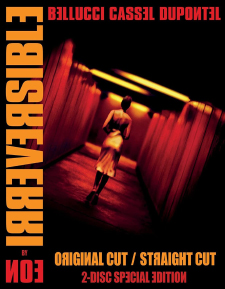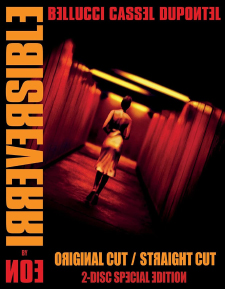Irreversible: Special Edition (Blu-ray Review)

Director
Gaspar NoéRelease Date(s)
2002 (June 27, 2023)Studio(s)
Mars Distribution (Altered Innocence/Vinegar Syndrome)- Film/Program Grade: A-
- Video Grade: B+
- Audio Grade: B+
- Extras Grade: B+
Review
Irreversible isn’t simply a title; it’s also a thesis statement, as well as a practical roadmap. What’s been done can’t be undone. Like Memento before it, Gaspar Noé’s 2002 film unfolds backwards, with each successive scene taking place prior to the preceding one. This reverse chronology in Irreversible isn’t just a gimmick to create a tantalizing puzzle box for viewers; instead, it’s an essential thematic component of the film. Of course, that didn’t stop Noé from following Christopher Nolan’s lead and creating a re-edited chronological version of the film in 2019 called Irreversible: Straight Cut (aka Irréversible – Inversion Intégrale), but ironically enough that cut feels far more gimmicky than the original 2002 version did. Worse, Noé’s intentions are muddled without the reinforcement given by the reversed structure as it runs the risk of making the film appear to be a conventional rape/revenge drama—which is one thing that Irreversible absolutely is not.
Irreversible takes place in a series of a dozen tableaus, each of which appears to be a single unbroken shot (although they’re really composed of shorter takes that were stitched together during post-production). The prologue—which is actually the coda, when considered chronologically—features an appearance by Phillipe Nahon, the star of Noe’s debut feature film I Stand Alone (aka Seul contre tous), who bluntly states the film’s core theme: “Time destroys everything.” What follows is a shockingly violent sequence at a Parisian night club where Marcus (Vincent Cassel) and Pierre (Albert Dupontel) confront someone who they believe to be responsible for the violent rape of Alex (Monica Bellucci.) A few sequences later, that brutal rape is shown taking place in a single agonizingly unbroken shot that lets neither the camera nor the viewer look away from what is happening. Then, over the next few sequences after that, the relationships between the characters are fully explored, culminating with what is now an ironic look at the hope of their new lives together.
Having all of these elements unfold in reverse order emphasizes the fact that nothing that happens can change what has already happened previously. It also divorces cause from effect, since events occur out of context. That’s what differentiates Irreversible from other rape/revenge films: it deprives viewers of any opportunity for catharsis. The unflinchingly horrifying nature of Alex’s rape could make even the misplaced revenge that follows it feel satisfying, but the reverse chronology prevents that from happening. Nothing in Irreversible feels justified, merely inevitable.
Noé has always been a provocateur, and Irreversible is no exception. Along with filmmakers like Catherine Breillat, Alexandre Aja, and Virginie Despentes, he has been lumped into what critic James Quandt derisively termed “New French Extremity.” Aside from the questionable nature of that classification, Noé’s provocation has always been more of a formal nature than strictly in terms of content. Irreversible opens with the closing credits, appropriately scrolling backwards, but Noé immediately introduces an element of instability by having the camera rotate around them—an effect that marks much of the camerawork throughout the first half of the film. The unstable nature of the characters is reflected in the instability of the camera, and post-production effects were used to enhance that disequilibrium. Noé doesn’t allow anyone to find their footing, audiences included. It’s only as the film progresses backward in time and everything becomes clearer that the camerawork does so as well. Yet as the film ends on its ironically hopeful note, the camera begins spinning out of control again, serving as a reminder that nothing can stop the tragic chain of events. Time will indeed destroy everything.
Noé and cinematographer Benoît Debie shot Irreversible on 16 mm film (in Super-16 format) using Aaton XTR Prod and A-Minima cameras—Debie handled the lighting while Noé served as camera operator. (According to a few sources, including visual effects supervisor Rodolphe Chabrier, they also shot some Super 35 footage using Technovision cameras, but the American Cinematographer article about the film doesn’t mention that fact.) Everything was scanned to 25fps HD video for VFX and other postproduction work at 2K resolution, and then re-output to 35 mm film at 24fps for Irreversible’s theatrical release. The Theatrical Cut was restored by Noé in 2019 while he was working on the revised Straight Cut. While the Powerhouse Film Blu-ray in the U.K. retained the frame rate from the theatrical presentation, Altered innocence has opted to recreate the 25fps rate from the original postproduction and recent restoration work:
“Gaspar Noe shot and restored Irreversible at 25fps. To preserve the official runtime and the natural pitch of the frenetic audio for U.S. audiences we’ve encoded the film at 29.97fps progressively using a 2:2 pulldown method. No interlacing will be detectable as a result.”
That means that the running times of each version vary due to the slowdown that occurred when transferring 25fps video to 24fps film. The theatrical cut runs 97:26 at 24fps, but 93:27 at 25fps. (The Straight Cut versions are 89:34 and 86:01, respectively.) So, the Powerhouse Blu-ray is accurate to the theatrical version, while this Altered Innocence disc more accurately replicates the way that the film was produced. It’s not clear which version that Noé prefers, so in the absence of clear data in that regard, it will come down to personal preference. Since Altered Innocence didn’t encode the video in interlaced formats, it’s likely that they had to insert duplicated frames to encode things progressively. That may result in motion artifacts, but given the nature of Irreversible’s style, they’re not necessarily easy to detect.
Setting the frame rate question aside, it’s a fine presentation of the film, within the context of how it was produced. The image isn’t the sharpest, but it can’t be given the heavy digital manipulation that was done during postproduction. The grain is prominent throughout, but it’s also uneven thanks to that digital work. The colors look natural when they should, though the lighting scheme frequently favors heavy red, yellow, orange, and green tones. It’s not pretty, but it is an accurate translation of Noé and Debie’s intentions.
Audio options include French 5.1 and 2.0 DTS-HD Master Audio, with removable English subtitles. The 2.0 track appears to be true stereo with little in the way of encoded surround information, so the 5.1 track is preferable. Like the visuals, the sound design can be distressing at times. The earliest sequences in the film (chronologically speaking, the later scenes) are accompanied by a sub-30hz bass tone that was designed to put viewers ill at ease, and it works exactly as intended—although at 25fps, the pitch has shifted up slightly. The rest of the soundtrack supports the disorienting nature of the film, but the dialogue is still clear when it’s supposed to be, and Thomas Bangalter’s music is impactful.
The Altered Innocence Blu-ray release of Irreversible is a two-disc set that includes both the theatrical cut and the Straight Cut on separate discs. There was Limited Edition slipcover available directly from Vinegar Syndrome, but it’s already sold out. All of the extras are on the first disc only:
- The Irreversible Odyssey (HD – 41:35)
- Time Destroys All Things (HD – 14:33)
- SFX Featurette (Upscaled SD – 7:09)
- Stress Music Video (HD – 4:43)
- Outrage Music Video (HD – 4:35)
- Teaser Trailers (Upscaled SD – 3:16, 6 in all)
- Restoration Trailer (HD – 1:35)
- The Wounded Man Trailer (HD – 1:46)
- After Blue (Dirty Paradise) Trailer (HD – 1:28)
- Knife+Heart Trailer (HD – 2:06)
- Arrebato (Rapture) Trailer (HD – 1:41)
The Irreversible Odyssey is a documentary on the making of Irreversible featuring interviews with Noé, Cassel, Dupontel, Bellucci, the producers, effects artists, and more. It covers the entire production and release of the film, including its reception at Cannes. Noé explains the genesis of the project, admitting that the structure was inspired by Memento as well as Harold Pinter’s play Betrayal, though he had never actually seen the latter. He had only written three pages for the script before it went into production, with each scene outlined in a few sentences, and the rest was improvised—the film was actually greenlit without a completed script or even a budget. When discussing the notorious rape sequence, everyone involved makes the point that they wanted to avoid any kind of a glamorized representation of the act like in film such as The Accused or Straw Dogs, and that Deliverance was more of a touchstone for them.
SFX Featurette is a far too brief conversation with visual effects supervisor Rodolphe Chabrier, who rushes through explaining how he reframed the 1.66:1 negative to 2.35:1, removed camera shadows, and added windows to the taxi (there were none on set so that the camera could freely move in and out of the vehicle). He describes the rape sequence in a bit more detail—Noé’s preferred take had damage that had to be removed, and the observer in the background was comped in from a different take. (A certain anatomical detail was also added digitally.) He spends the most time on the brutal killing at the beginning of the film, which to this day remains one of the best marriages between practical and digital effects to produce a nauseatingly seamless result.
Time Destroys All Things is a visual essay by Alexandra Heller-Nicholas, author of Rape-Revenge Films: A Critical Study. She compares the Straight Cut to the Theatrical cut, drawing a contrast between the rape/revenge of the former, and the revenge/rape of the latter. She correctly notes that as the film runs different directions, so do our feelings. She also spends some time discussing the film’s relationship to the real-world threat of sexual violence. The Music Videos feature two different tracks from Thomas Bangalter’s score accompanied by swirling camerawork shot by Noé—the first set in the infamous red tunnel, and the second in Marcus & Alex’s apartment.
All of these extras were also included on the 2021 Region B-locked 2-disc Limited Edition from Powerhouse Films in the U.K., but many of the rest of the extras from that set aren’t offered here. That includes the commentary by Noé (originally recorded for the 2003 DVD release), the NFT50 Q&A, the BFI Masterclass with Noé, a Deleted Scene, the short film Intoxication, an Image Gallery, various other trailers, and an Easter Egg that identified all of the album covers in the background of the apartment at the end of the film (or the beginning, depending on which version that you watch). There was also an 80-page booklet featuring essays, reviews, the 2003 American Cinematographer article about the film, and more, as well as a fold-out poster. Needless to say, if you have that set, you’ll want to hold onto it for the extras alone. If you don’t, this Altered Innocence release has the advantage of being Region A, plus it also has a 25fps presentation of the film—although that may be a matter of taste.
While Irreversible bears only an indirect resemblance to Virginie Despentes and Coralie Trinh Thi’s Baise-moi, both films interrogate the rape/revenge genre in ways that will be uncomfortable for many viewers. Literally so with Irreversible—the sound design alone can induce physical distress, and the visuals could potentially trigger seizures. Baise-moi approaches the subject from the angle of justifiable female rage, while Irreversible looks at if from the point of view of misplaced male rage. They’re both challenging films, but in very different ways. Caveat emptor, but Irreversible belongs in the collection of every serious film fan who can handle difficult material like this.
- Stephen Bjork
(You can follow Stephen on Facebook at this link)

